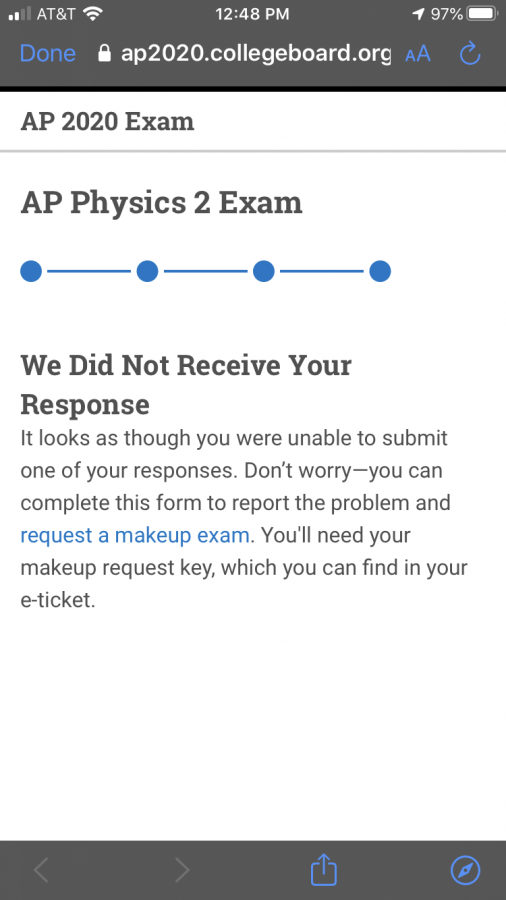Online Advanced Placement Tests Don’t Get Passing Grades from Students
June 2, 2020
The Advanced Placement Exams, more widely known as the APs, are a set of tests distributed and controlled by the College Board, and are one of the only opportunities for students to gain college credit during high school. These tests are traditionally given in May and take about three hours to complete. AP classes are a popular course taken amongst students not only in Pelham, but across the country. So, when the College Board announced they would be allowing students to take the exam online, many teachers and students wondered how successful this new alternative would be. Online exams began on May 11, and since their implementation, the College Board has been met with aggressive backlash.
A traditional AP Exam would normally consist of two or three essays, multiple choice and short answer questions, which vary depending on which course is taken. The format of the test, however, changed for the online version. Instead of the traditional mix of questions, tests were shortened to either two short answer questions or one essay with open notes in fifty minutes. The idea was simple, have the students write an answer in the amount of time given and then upload their work by either taking a picture with their phone, copy and pasting their answer from a document, or uploading the document as a file. This would allow students to take the test from any device, whether it be a mobile phone or a desktop computer.
“I thought it was much easier than the in-person test because you could use your notes and it was only one essay, but it was a bit challenging because of the short amount of time we had,” said junior Chloe Catana. The plan on paper seemed like a convenient substitute during this time of quarantining and isolation, but by the time the test rolled around many significant issues emerged.
With thousands of students logging on to the College Board website to take their test at the same time, many students encountered technical difficulties as servers were overloaded. Some students were not able to either submit their work or get into their test on time because of technical issues on the College Board’s end. Those thousands of students who were unable to either complete their test or submit their answers were left with the choice of requesting a make-up exam in June, or forfeiting their chance to take the test.
“Unfortunately I was unable to submit my calculus exam because I couldn’t convert my files into a .jpg in time. This is something I could’ve researched how to do beforehand, but I still think the window to submit our answers could’ve been more flexible!” said senior Morgan Sample.
This “solution” angered many students and teachers alike, causing tons of backlash that the College Board was not prepared to face. According to the statement released on their twitter account, they blamed the issues on students having outdated browsers, which was certainly not the case for many test takers, who responded by saying their browsers were up to date during the test.
“It was stressful. It was hard to log in because of the amount of people on the site. Then because of other people’s experiences of not being able to turn in their work, I wasn’t able to use all my time because I was afraid the test would be invalid. I prefer taking the test in person because I know those things wouldn’t have happened.” said junior Briana Conolly.
Due to the mounting concerns of students, teachers, and parents, the College Board created a different solution to the problem. During the second week of AP exams, students who had issues with submitting their answers would be able to send those answers to the College Board’s email. Although this didn’t help with other technical issues, such as getting into the test, it did relieve some stress for students during the second week of testing. Those during the first week however, will still have to retake the exam in June.
As of right now, the College Board is facing a class-action lawsuit on behalf of the students with botched tests. This lawsuit was filed by parents of students who had issues with their test, and a nonprofit organization who works towards ending the misuse of standardized testing known as FairTest. According to the Washington Post, the College Board is being sued for having “engaged in a number of ‘illegal activities,’ including breach of contract, gross negligence, misrepresentation and violations of the Americans With Disabilities Act.”
The article also states that the lawsuit “demands that the College Board score their answers instead of requiring them to retake the test in June, and provide hundreds of dollars in monetary relief.” This class-act lawsuit is seeking upwards of five hundred million as compensation as well as penal actions.
The College Board’s Chief risk officer and general counsel, Peter Schwartz, gave a statement about this lawsuit, saying “It was wrong factually and baseless legally; the College Board will vigorously and confidently defend against it, and expect to prevail.”
COVID-19 has undoubtedly affected all aspects in our daily lives, including student’s ability to learn and take exams. Now with the College Board under fire for these faulty exams, students who went through these issues can now only hope that they will be able to receive college credit, even if for some of them it will have to come months after it was intended to.




